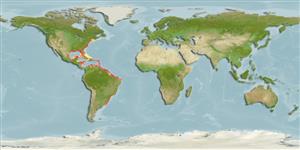分类 / Names
俗名 | 同种异名 | Catalog of Fishes(属, 种) | ITIS | CoL | WoRMS | Cloffa
Teleostei >
Clupeiformes (Herrings)
鯡目 (Herrings) >
Engraulidae (Anchovies)
鯷科 (Anchovies) > Engraulinae
Etymology: Anchoa: Italian ancioa = anchovy (Ref. 45335).
More on author: Linnaeus.
Environment: milieu / climate zone / depth range / distribution range
生态学
海洋; 半咸淡水; 深度上下限 1 - 70 m (Ref. 189). 亞熱帶的; 44°N - 36°S, 98°W - 32°W (Ref. 189)
Western Atlantic: Massachusetts, USA perhaps occasionally straying north to Maine or even Nova Scotia (Canada), south to Fort Pierce, Florida (but not Florida Keys) and at least northern Gulf of Mexico; also from Gulf of Venezuela south to Uruguay. Replaced by Anchoa colonensis in the West Indies.
西大西洋: 也許偶然地迷路的美國麻薩諸塞州北至緬因州或者平坦的新斯科舍省 (加拿大),南至堡壘皮爾斯, 佛羅里達 (但是不是佛羅里達珊瑚礁) 而在最少的墨西哥灣北部; 也從委內瑞拉灣南至烏拉圭。 在西印度群島被 Anchoa colonensis 取代了。
大小 / 重量 / 年龄
Maturity: Lm ? range ? - ? cm
Max length : 15.3 cm TL 雄鱼/尚未辨别雌雄; (Ref. 37032); common length : 11.0 cm TL 雄鱼/尚未辨别雌雄; (Ref. 5217)
背棘 (总数) : 0; 背的软条 (总数) : 14 - 17; 臀棘: 0; 臀鳍软条: 20 - 24. Snout pointed, about 3/4 eye diameter; maxilla long, tips pointed, reaching beyond hind border of pre-operculum, almost to gill opening; gill cover canals of panamensis-type. Anal fin origin below about midpoint of dorsal fin base. Anus nearer to anal fin origin than to pelvic fin tips. Silver stripe along flank (a dark line above) of uniform width, narrowed immediately behind band (Ref. 189). Back greenish, some yellowish on head. Melanophores outline all dorsal scales (Ref. 7251).
吻端尖的, 大约 3/4 眼直径; 颚骨长的, 顶端尖的, 超过前鳃盖的后部边缘, 几乎到鳃裂; panamensis 的鳃盖运河-类型。 臀鳍起源背鳍基底的大约中点下面。 肛门较接近到臀鳍起源超过对腹鳍顶端。 银色的斑纹沿着被狭窄的均匀宽度的侧面 (一个黑色线条之上) 在条纹正后方.(参考文献 189) 背面呈绿色的, 一些淡黄色的在头部上。 黑色素细胞轮廓所有的背部鳞片.(参考文献 7251)
Forms dense schools, often in shallow waters close to shore. Able to tolerate a wide range of salinities, from hypersaline to almost fresh. Feeds on copepods when young, then on gastropods, foraminifers and an occasional ostracods and annelid. Breeding was recorded in April through to July at Beaufort, North Carolina. Breeds in harbors, estuaries and sounds. Eggs are elliptical, transparent, without oil globule, the yolk appearing `cellular' (Ref. 189). Great variation. Principal parasites are nematodes and cestodes (Scolex polymorphus and Rhynchobothrium sp.) and trematodes (Distomum appendiculatum and Distomum sp). Marketed as food (Ref. 37032).
形成密集的鱼群, 常见于浅水域中接近海岸。 从高盐度到几乎淡水,能容忍宽范围的盐度。 吃桡脚类的动物幼年时, 然后捕食腹足动物有孔虫与偶而介形虫与环节动物。 繁殖在北卡罗莱那州的碧佛经过到七月被记录四月时。 繁殖于港湾,河口与声音。 卵是椭圆的,透明的, 没有油球,卵黄出现多孔的'.(参考文献 189) 大的变化。 主要的寄生虫是线虫类与条虫 ( 头筛 polymorphus 与 Rhynchobothrium sp.) 与吸虫 ( Distomum appendiculatum 与 Distomum sp) 。 在市场上销售当作食物了。 (参考文献 37032)
Life cycle and mating behavior
成熟度 | 繁殖 | 产卵场 | 卵 | 孕卵数 | 仔鱼
Spawn in school (Ref. 205).西大西洋: 也許偶然地迷路的美國麻薩諸塞州北至緬因州或者平坦的新斯科舍省 (加拿大),南至堡壘皮爾斯, 佛羅里達 (但是不是佛羅里達珊瑚礁) 而在最少的墨西哥灣北部; 也從委內瑞拉灣南至烏拉圭。 在西印度群島被 Anchoa colonensis 取代了。
Whitehead, P.J.P., G.J. Nelson and T. Wongratana, 1988. FAO Species Catalogue. Vol. 7. Clupeoid fishes of the world (Suborder Clupeoidei). An annotated and illustrated catalogue of the herrings, sardines, pilchards, sprats, shads, anchovies and wolf-herrings. FAO Fish. Synop. 125(7/2):305-579. Rome: FAO. (Ref. 189)
世界自然保护联盟红皮书 (Ref. 130435: Version 2024-2)
人类利用
渔业: 低经济; 诱饵: usually
工具
特别资料
下载 XML
网络资源
Estimates based on models
Preferred temperature (Ref.
123201): 15 - 28, mean 24.4 °C (based on 480 cells).
Phylogenetic diversity index (Ref.
82804): PD
50 = 0.5000 [Uniqueness, from 0.5 = low to 2.0 = high].
Bayesian length-weight: a=0.00525 (0.00417 - 0.00661), b=3.15 (3.11 - 3.19), in cm total length, based on LWR estimates for this species (Ref.
93245).
营养阶层 (Ref.
69278): 3.3 ±0.0 se; based on diet studies.
回复力 (Ref.
120179): 高度, 族群倍增时间少于 15个月 (tm=1; Fec=5700).
Fishing Vulnerability (Ref.
59153): Low vulnerability (10 of 100).
Climate Vulnerability (Ref.
125649): Low vulnerability (21 of 100).
Nutrients (Ref.
124155): Calcium = 187 [107, 388] mg/100g; Iron = 1.73 [0.91, 3.05] mg/100g; Protein = 18.1 [15.8, 20.8] %; Omega3 = 0.514 [0.268, 0.972] g/100g; Selenium = 20.3 [9.1, 47.5] μg/100g; VitaminA = 11.2 [3.4, 32.7] μg/100g; Zinc = 1.4 [1.0, 2.1] mg/100g (wet weight); based on
nutrient studies.
